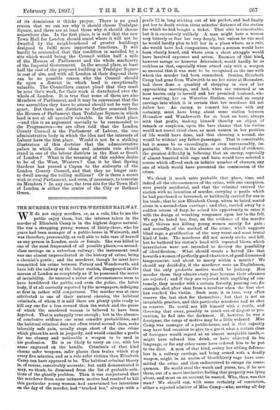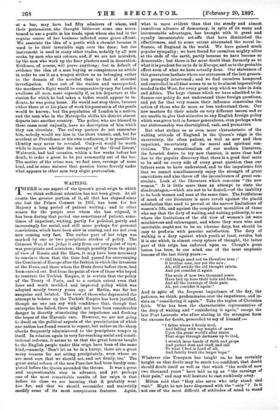THE MURDER ON THE SOUTH-WESTERN RAILWAY.
WE do not enjoy murders, or, as a rule, like to see the public enjoy them, but the interest taken in the murder of Elizabeth Camp is in the highest degree natural. She was a strapping young woman of thirty-three, who for years had been manager of a public-house in Walworth, and was therefore, presumably, as well able to take care of herself as any person in London, male or female. She was killed in one of the most frequented of all possible places,—a second- class carriage on a suburban railway ; the instrument used was one almost unprecedented in the history of crime, being a chemist's pestle ; and the murderer, though he must have committed his crime between Putney and Wandsworth, and have left the railway at the latter station, disappeared in the morass of London as completely as if he possessed the secret of invisibility. So unusual a series of circumstances seem to have bewildered the public, and even the police, the latter body, if at all correctly reported by the newspapers, indulging at first in rather wild conjectures. The murder was at once attributed to one of their natural enemies, the habitual criminals, of whom it is said there are plenty quite ready to kill any one for a less reward than the watch and the purse of which the murdered woman is believed to have been deprived. That is unhappily true enough ; but in the absence of conclusive evidence one must consider probabilities, and the habitual criminal does not often travel second class, seeks tolerably safe gain, usually stops short of the one crime which places his neck in jeopardy, and would consider a pestle far too clumsy and noticeable a weapon to be used in .his profession. He is as likely to carry an axe, with his name engraved on the handle. Criminals of that kind choose safer weapons, safer places than trains which stop every five minutes, and as a rule safer victims than Elizabeth Camp can have appeared to be. The habitual criminal theory m, of course, conceivably accurate; but until demonstrated it may, we think, be dismissed from the list of probable solu- tions of the ghastly problem. Then it was conjectured that the murderer from some unknown motive had resolved to kill this particular young woman, had ascertained her intentions on the day of the murder, had " tracked her," always with a pestle 12 in. long sticking out of his pocket, and had finally put her to death within three minutes' distance of the station for which he had bought a ticket. That also is conceivable, but it is excessively unlikely. A man might hate a woman very bitterly or fear her very deeply, but unless he was mad he would hardly plan to kill her in a place where, as a rule, she would have had companions, where a scream would have been clearly heard, and where even a short struggle would have involved exposure and arrest. Enemies of that kind, however savage or however determined, would hardly be as reckless as that, especially when armed only with a weapon so unusual that it was sure to be recognised as the one with which the murder had been committed. Besides, Elizabeth Camp had gone from Walworth to see her sister at Hounslow, had there done a quantity of shopping in view of her approaching marriage, and had, when she returned at an hour known only to herself and her promised husband, who was awaiting her on Waterloo Station, entered an empty carriage into which it is certain that her murderer did not follow her. An enemy, to commit his crime with any certainty, must have hung about some station between Hounslow and Wandsworth for at least an hour, always with that pestle, making himself thereby an object of remark or suspicion, upon the bare chance that his victim would not travel third class, as most women in her position of life would have done, and that choosing a second, she would be without any fellow-passenger. That is conceivable, but it seems to us exceedingly, or even unreasonably, im- probable. We have, in the absence as aforesaid of evidence, the greatest difficulty in believing that an enemy, especially if almost besotted with rage and hate, would have selected a course which offered such an infinite number of chances, any one of which would have prevented the commission of the crime.
We think it much more probable that place, time, and indeed all the circumstances of the crime, with one exception, were purely accidental, and that the criminal entered the station with no intention of murder, carrying a pestle which he had purchased or borrowed, or habitually carried for use in his trade; that he saw Elizabeth Camp, whom he hated, seated alone in a second-class carriage ; and that, carried away by a sudden access of fury, be seized his opportunity to enter it with the design of wreaking vengeance upon her to the full. We say be hated her, first, on the evidence of the murder itself, thieves not killing young women merely for gain ; and secondly, of the method of the crime, which suggests blind rage, a gratification of the very worst and most brutal kind of hate. The murderer did not merely strike and kill, but he battered his victim's head with repeated blows, which nevertheless were not intended to destroy the possibility of identification. What should create a hatred like that towards a woman of perfectly good character, of good-humoured temperament, and about to marry within a month? We should say decidedly, if the murderer were an Englishman, that the only probable motive would be jealousy. Men murder those they admire Every year because their advances are rejected; and if they are rejected with anything of con- tumely, they murder with a certain ferocity, pouring out, for example, shot after shot from a revolver when the first shot has reached the victim. Such men, it is true, very often reserve the last shot for themselves ; but that is not an invariable practice, and this particular murderer had no shot to reserve. He could not kill himself with a pestle, and throwing that away, possibly as much out of disgust as pre- caution, he fled into the darkness. If, however, he was a foreigner, the range of motive may be a little widened. Miss Camp was manager of a public-bouse, and in that capacity may have had occasion to give to a guest what a certain class of foreigner would regard as an almost inexpiable insult,— might have refused him drink, or have objected to his language, or for any other cause have ordered him to be put to the door. A man of that kind, seeing her sitting defence- less in a railway carriage, and being armed with a deadly weapon, might in an access of bloodthirsty rage have com- mitted the crime and then endeavoured to escape its conse- quences. He would steal the watch and purse, too, if he saw them, out of a mere instinctive feeling that property was lying about, and must on no account be wasted. Who, then, was this man? We should say, with some certainty of conviction, either a rejected admirer of Miss Camp—who, serving all day
at a bar, may have had fifty admirers of whom, and their pretensions, she thought little—or some one accus- tomed to use a pestle in his trade, upon whom she had in the regular course of her business inflicted some grave affront. We associate the idea of a pestle with a chemist because it used to be their invariable sign over the door ; but the instrument is used in many other trades, notably by all men cooks, by men who mix colours, and, if we are not mistaken, by the men who work up the finer plasters used in decoration. Evidence, of course, will prove anything ; but in default of evidence the idea of a man buying so conspicuous an article in order to use it as a weapon strikes us as belonging rather to the domain of the novelist than to that of criminal investigation. Once out of the station and unsuspected, the murderer's flight would be comparatively easy, for London swallows all men, more especially if, as his departure at the station for which he had taken a ticket would appear to in- dicate, he was going home. He would not stop there, because either there or at his place of work his possession of the pestle -would be known; but the population of London is a nation, and the man who in the Metropolis shifts his district almost departs into another country. The police, who are blamed in these cases most unjustly, have no description of him which they can circulate. The railway porters do not remember him, nobody would see him in the short transit, and, but for accident or Providence or his own confession, it is possible his identity may never be revealed. Only—it would be worth while to inquire whether the manager of the • Good Intent,' Walworth, had had occasion, within a few weeks before her death, to order a guest to be put summarily out of the bar. The motive of the crime was, we feel sure, revenge of some kind, and in some natures that passion burns fiercely under what appears to other men very slight provocation.



































 Previous page
Previous page